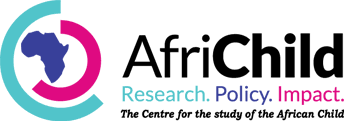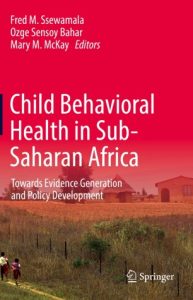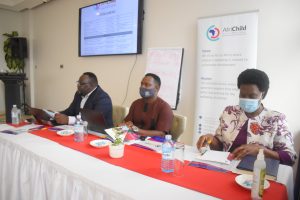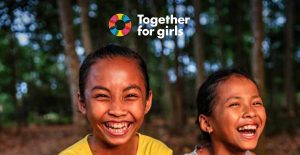The AfriChild Centre held its Annual General Meeting last week on Friday 10, December 2021, at Golden Tulip Hotel in Kampala, and some of the members attended via zoom link in line with the COVID-19 SOPs.

While delivering her report, Margaret Kakande, Chairperson Board of Directors, AfriChild, noted that the Board provided oversight and guidance to the secretariat throughout the year despite the challenges raised by the pandemic. Kakande commended the Board members Judy Kamanyi, Professor Lynne Atuyambe, and Emily Gakiza for being a pillar of good governance and providing strategic guidance to the leadership of the AfriChild Centre.

Fall in numerical strength
On a sad note, she informed members that the numerical strength of the Board declined in 2021.
“Ms. Peninnah Kyoyagala Tomusange took on a role with the United Nations, working outside Uganda. Her promotion to a senior position this year and the increasing restrictions on UN staff as Board members to NGOs did not allow her to carry on as a Board member of AfriChild. On July 1, 2021, she resigned from serving on the AfriChild Board,” Kakande told the meeting.
“On July 6, 2021, we lost Mr. James Kaboggoza Ssembatya. Mr. Kaboggoza played a central role in the establishment of the AfriChild Centre. He served on the inaugural Advisory Board of AfriChild. In the spirit of business continuity and institutional memory, when the Board of Directors was constituted, Mr. Kaboggoza transitioned to the new structure. He was knowledgeable about child protection, and he was fondly referred to as an ‘Encyclopedia on Children’s issues in Uganda. Mr. Kaboggoza made an immense contribution in uplifting the well-being of children in the country, and he shall forever be missed,” Kakande added.

While reporting on the performance of the Centre, Kakande noted that since its inception in 2013, The AfriChild Centre has remained committed to developing, improving, and reinforcing strategies, structures, and processes for greater effectiveness and to adapt to constant changes in the working environment.
Policy and compliance
On policy and compliance, Kakande assured the stakeholders that AfriChild is a compliant organisation with a culture of adherence to the laid down policies.
“As a Board, we consistently monitor the policy environment to ensure that our policies are relevant to the dynamic environment in which we work,” she said.
Kakande also informed the members that the AfriChild Centre has developed a second Strategic Plan (2021-2026) which will be launched in January 2022.
“The plan was completed and approved by the Board on May 3rd, 2021. The strategic plan sets us on an ambitious growth path, with a vision of an African Continent where children’s wellbeing is realised for sustainable development.”
Resource mobilization and financial performance
In the area of resource mobilisation, Kakande told the members that in the year 2020/21, AfriChild’s general income was Ushs 2.7 billion compared to Ushs 1.2 billion in 2019/20.
“Overall, our income increased by 103%. Relatedly, our expenses also increased by 97% to Ushs 2.5 billion in 2020/21 from Ushs 1.2 billion in the previous year. During the review period, the surplus is Ushs 189 million.
This growth was possible because of new grants and research projects as well as our blossoming partnerships with other players in the research and children’s sector in and outside the country.”
Research
Generating local knowledge through research, to impact policy for the wellbeing of children is the raison d’être of the AfriChild Centre. Our work in research generation has focused on building capacity for research generation and the development and implementation of research projects.
Under research capacity, the AfriChild Centre trained a second cohort for the flagship Inter-University Research Methods Training Program. The training equips budding researchers with skills in child-focused research. A total of 34 academics from 7 universities benefitted from this modular training.
The AfriChild Centre in partnership with Together for Girls and the Centres for Diseases Control and Prevention (CDC) conducted a research fellowship to strengthen individual and institutional in-country research capacity to generate and utilize VACs data. This is to generate evidence for policy and programming for prevention and improved responses to violence. Under the auspices of this engagement, two research fellows and three staff members trained in quantitative data analysis.
The Centre embarked on reviewing and developing a national child-focused policy research agenda. This is a successor research agenda that follows the first one that was developed by AfriChild in 2015 in partnership with UNICEF, UBOS, and the Ministry of Gender, Labour and Social Development.
Since last year, the Centre has been engaging in various research projects, including those that were carried over from 2019/2020, and new research opportunities that have been acquired during this year. These include:
- Under the AfriChild Centre/ Together for Girls and the Centres for Diseases Control and Prevention (CDC) partnership that was highlighted above, we have embarked on the generation of research evidence to inform interventions on violence against children.
- A randomized control trial of enhanced Child-Friendly Space interventions for girls and boys affected by conflict and displacement is ongoing.
- In 2020/21, AfriChild synthesized available evidence on the state of Ugandan fathers’ contribution to care work in the country.
- The AfriChild Centre is conducting an impact evaluation of the “empowering communities to protect children” intervention implemented by ChildFund for three years in two sub-counties, Matidi and Lagoro, in Kitgum District, Northern Uganda. This evaluation research which is funded by the Evaluation Fund sets out to measure the impact and sustainability of a Community Based Child Protection Intervention in Post Conflict Settings in Northern Uganda, to generate evidence for violence prevention measures.
- Good Schools Toolkit Study (GST-S) is a Pilot Trial study in partnership with the London School of Hygiene and Tropical Medicine, and Raising Voices. This pilot and its scaling up have been halted due to school closures.
- Mapping Child Protection and Honour Study is a multi-country study taking place in Uganda, Sri Lanka, New Zealand, and South Africa in partnership with the London School of Hygiene and Tropical Medicine, to explore how global narratives of child protection and perspectives of honour affect child wellbeing. In this study, AfriChild is using an innovative youth participatory approach to enhance children’s meaningful participation in research, with the youth actively involved as peer researchers.
- Cognitive testing of gender measures in the Violence against Children Survey tests gender measures in violence against children surveys. AfriChild is conducting this study in partnership with Together for Girls and the University of California San Diego (UCSD).
- Testing a Child Participation Tool is ongoing. AfriChild in partnership with the Care and Protection of Children (CPC) Learning Network is testing out a tool that aims at enhancing child participation in research and programming, particularly in humanitarian settings. AfriChild is piloting this tool with children in research in Uganda to generate more evidence on its efficacy in promoting meaningful child participation.

Timothy Opobo, the Executive Director AfriChild commended the guidance provided by the Board in steering the Centre forward. He thanked the staff of AfriChild for the commitment and hard work displayed in the last year that enabled the Centre to produce two timely study reports to respond to emerging issues in the lives of children. The two reports were The impact of COVID-19 on the wellbeing of children and another report on the State of Uganda’s Fathers report.
Timothy pledged to work with all the partners to build a stronger AfriChild with a regional presence on the continent.






